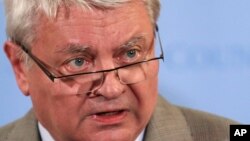UNITED NATIONS —
The U.N.’s peacekeeping chief has urged “serious consequences” for spoilers to the peace process in South Sudan, saying that without action, civilians will continue to suffer. Security Council members discussed the possibility of imposing sanctions on South Sudan following an escalation in deadly violence.
U.N. peacekeeping chief Hervé Ladsous said Wednesday the cycle of violence that erupted in South Sudan in December must stop.
“It must stop immediately. Yet we see that neither party is ready to, in any way, cease the hostilities. The agreement on that which was signed exactly to this day three months ago has never been implemented. They do not give indication that they want to sincerely participate in the peace talks," said Ladsous.
Ladsous was speaking to reporters after briefing an emergency meeting of the U.N. Security Council. The Council met to discuss recent violence, including a massacre of civilians in Bentiu in Unity State and an attack on a U.N. compound in Bor, the capital of Jonglei state.
The U.N. has nearly 8,500 peacekeepers in South Sudan and has requested more to help stop the violence. But attacks have continued and relations between the U.N. mission and the government have strained over the violence.
Ladsous said the Status of Forces Agreement between the U.N. and Juba has been the object of a “number of violations,” and that peacekeepers have been impeded in many ways from doing their job.
He said the U.N. mission - known as UNMISS - has shifted its focus to four tasks: protecting civilians, providing humanitarian access, human rights and supporting the regional mediation process under IGAD.
“Let us be aware that unless there are serious consequences for the parties to cease the violence and to engage in meaningful talks - peace process - if it does not happen the toll on innocent civilians will continue to rise," he said.
Speaking before the meeting, French Ambassador Gérard Araud said the 15-nation Council must do some “soul searching” about what the U.N. should do in South Sudan. He said the Council should consider imposing sanctions, because the situation is “horrendous.”
Security Council president Nigerian Ambassador Joy Ogwu told reporters the Council discussed sanctions. She said several Council members suggested the “principle of deterrence” to send an unequivocal message to the parties responsible for the violence that it must not happen again.
Fighting erupted in South Sudan in mid-December, as the army of President Salva Kiir and rebels allied with his former vice president Riek Machar began fighting each other. The violence has killed thousands and displaced more than 1 million South Sudanese from their homes.
U.N. peacekeeping chief Hervé Ladsous said Wednesday the cycle of violence that erupted in South Sudan in December must stop.
“It must stop immediately. Yet we see that neither party is ready to, in any way, cease the hostilities. The agreement on that which was signed exactly to this day three months ago has never been implemented. They do not give indication that they want to sincerely participate in the peace talks," said Ladsous.
Ladsous was speaking to reporters after briefing an emergency meeting of the U.N. Security Council. The Council met to discuss recent violence, including a massacre of civilians in Bentiu in Unity State and an attack on a U.N. compound in Bor, the capital of Jonglei state.
The U.N. has nearly 8,500 peacekeepers in South Sudan and has requested more to help stop the violence. But attacks have continued and relations between the U.N. mission and the government have strained over the violence.
Ladsous said the Status of Forces Agreement between the U.N. and Juba has been the object of a “number of violations,” and that peacekeepers have been impeded in many ways from doing their job.
He said the U.N. mission - known as UNMISS - has shifted its focus to four tasks: protecting civilians, providing humanitarian access, human rights and supporting the regional mediation process under IGAD.
“Let us be aware that unless there are serious consequences for the parties to cease the violence and to engage in meaningful talks - peace process - if it does not happen the toll on innocent civilians will continue to rise," he said.
Speaking before the meeting, French Ambassador Gérard Araud said the 15-nation Council must do some “soul searching” about what the U.N. should do in South Sudan. He said the Council should consider imposing sanctions, because the situation is “horrendous.”
Security Council president Nigerian Ambassador Joy Ogwu told reporters the Council discussed sanctions. She said several Council members suggested the “principle of deterrence” to send an unequivocal message to the parties responsible for the violence that it must not happen again.
Fighting erupted in South Sudan in mid-December, as the army of President Salva Kiir and rebels allied with his former vice president Riek Machar began fighting each other. The violence has killed thousands and displaced more than 1 million South Sudanese from their homes.
